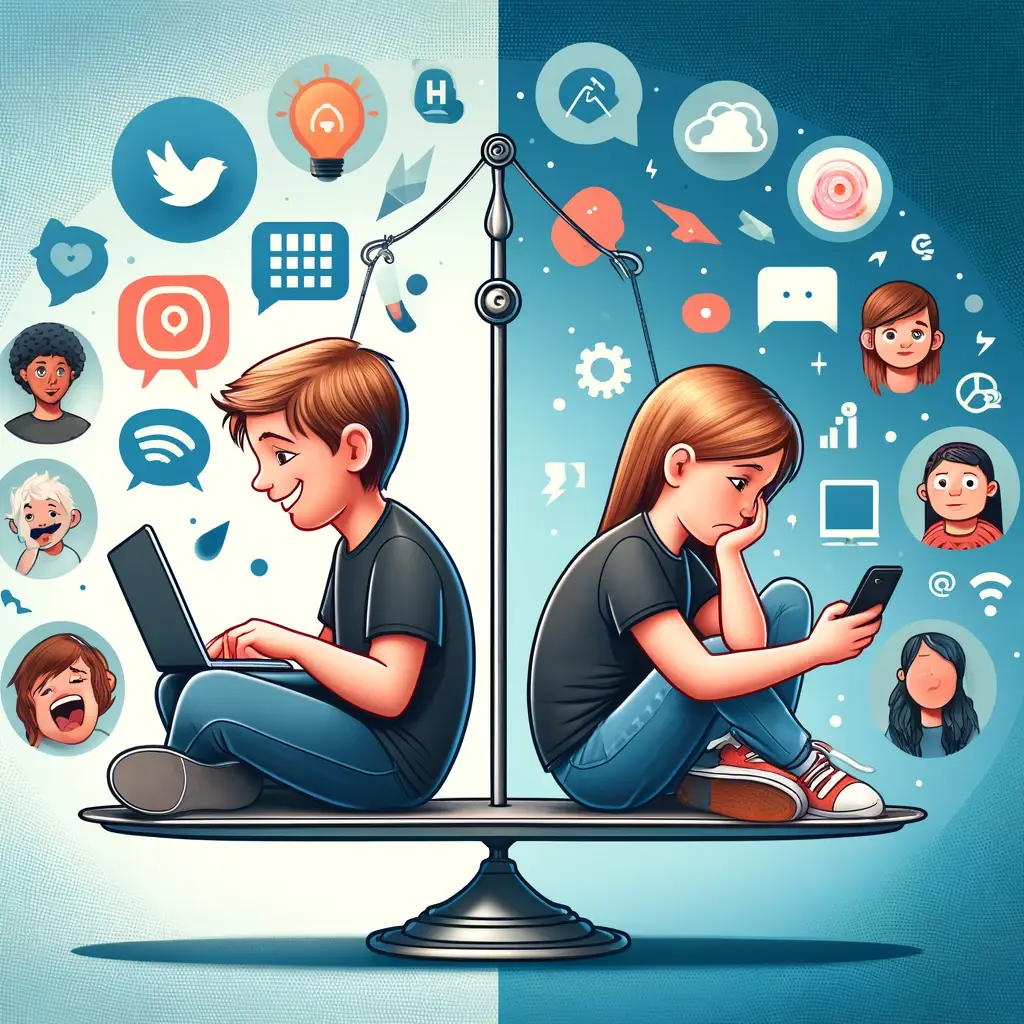Introduction
Social media has become an integral part of modern life, especially for children and teenagers. While it offers numerous benefits, it also presents several challenges. As a parent, understanding the pros and cons of social media use is crucial to help your children navigate the digital world safely and responsibly.
Pros of Social Media Use
- Social Connectivity: Social media allows children and teenagers to stay connected with friends and family, fostering social bonds and support networks. It can be particularly beneficial for those who may feel isolated or have difficulty making friends in person.
- Educational Resources: Platforms like YouTube, Instagram, and TikTok offer educational content that can supplement traditional learning. Teens can follow accounts related to their interests, such as science, art, or history, enhancing their knowledge outside of the classroom.
- Self-Expression and Creativity: Social media provides a platform for self-expression through posts, stories, and videos. This can boost creativity and help children and teenagers develop their identities and share their talents with a wider audience.
- Community Building: Teens can find and join communities based on shared interests, which can provide a sense of belonging and support. This is particularly valuable for those with niche interests or those who feel marginalized in their offline lives.
Cons of Social Media Use
- Cyberbullying: Social media can be a breeding ground for cyberbullying, which can have severe psychological effects. Children and teenagers may face harassment, threats, or negative comments that can lead to anxiety, depression, and low self-esteem.
- Addiction and Screen Time: Excessive use of social media can lead to addiction, negatively impacting sleep, academic performance, and physical health. The constant need to check notifications and updates can also contribute to increased stress and anxiety.
- Privacy Concerns: Children and teenagers may not fully understand the implications of sharing personal information online. This can lead to privacy breaches and exposure to inappropriate content or online predators.
- Unrealistic Expectations: Social media often portrays idealized versions of life, leading to unrealistic expectations and comparisons. This can result in feelings of inadequacy, poor body image, and mental health issues.
What Parents Can Do to Protect Their Children
- Open Communication: Foster an open and honest dialogue about social media use. Encourage your children to share their experiences and concerns with you without fear of judgment or punishment.
- Set Boundaries and Limits: Establish clear guidelines for social media use, including time limits and appropriate content. Use parental controls and monitoring tools to ensure these boundaries are respected.
- Educate About Online Safety: Teach your children about the importance of privacy settings, recognizing online dangers, and not sharing personal information. Encourage them to think critically about what they see and share online.
- Promote Healthy Habits: Encourage a balanced lifestyle that includes physical activity, face-to-face social interactions, and offline hobbies. Lead by example by limiting your own screen time and demonstrating healthy digital habits.
- Monitor and Support: Keep an eye on your children’s social media activities without being intrusive. Be aware of signs of cyberbullying or other negative experiences and offer support and intervention when necessary.
- Empower with Knowledge: Equip your children with the knowledge and skills to navigate social media responsibly. Discuss the potential risks and benefits, and encourage them to make informed decisions.
How to Recognize If Social Media Is Affecting Your Child’s Well-Being
Understanding whether social media is having a negative impact on your child or teenager can be challenging. However, there are several signs and patterns of behavior you can watch for that might indicate an issue. Here are some key indicators that social media may be affecting your child’s well-being:
Behavioral Changes
- Increased Anxiety or Depression: Noticeable shifts in mood, such as increased sadness, irritability, or anxiety, can be linked to negative experiences on social media. If your child seems more withdrawn or frequently upset after using social media, it could be a red flag.
- Changes in Sleep Patterns: Excessive social media use can disrupt sleep patterns, leading to insomnia or excessive sleepiness during the day. If your child is staying up late to use social media or has difficulty waking up, this might be a concern.
- Decline in Academic Performance: If your child’s grades start slipping, and they seem distracted or uninterested in schoolwork, it might be due to the time and energy they are spending on social media.
- Withdrawal from Offline Activities: A lack of interest in hobbies, sports, or socializing with friends in person can indicate that social media is consuming too much of your child’s time and attention.
- Changes in Eating Habits: Significant changes in appetite or eating habits, such as skipping meals or overeating, can be linked to emotional distress caused by social media.
Social and Emotional Indicators
- Decreased Self-Esteem: If your child frequently compares themselves to others on social media and feels inadequate or unworthy, it can lead to a decrease in self-esteem. Pay attention to comments about feeling “not good enough” or “unattractive.”
- Increased Sensitivity to Feedback: Overreaction to likes, comments, or the lack thereof on their posts can be a sign that social media is affecting your child’s self-worth.
- Social Isolation: Despite being constantly connected online, your child might feel isolated or lonely. They may express that they don’t have real friends or that online interactions are not fulfilling.
- Exposure to Negative Content: Cyberbullying, exposure to inappropriate content, or interactions with online predators can significantly impact your child’s emotional well-being. Be alert to any signs of distress following online interactions.
Physical Symptoms
- Headaches and Eye Strain: Prolonged screen time can lead to physical symptoms such as headaches, eye strain, or blurred vision. If your child frequently complains about these issues, it might be due to excessive social media use.
- Changes in Physical Activity: A noticeable decrease in physical activity or reluctance to engage in outdoor play can be a sign that social media is taking precedence over healthier activities.
How to Address These Concerns
If you notice any of these signs, it might be time to take action:
- Have an Open Conversation: Talk to your child about their social media use. Ask open-ended questions about their experiences and feelings related to social media. Listen without judgment to understand their perspective.
- Set Healthy Boundaries: Establish rules for social media use, such as screen time limits and device-free zones (like during meals or before bedtime). Encourage a balanced lifestyle that includes offline activities.
- Monitor and Educate: Keep an eye on your child’s social media activity and educate them about online safety and the potential impacts of social media on mental health.
- Seek Professional Help: If you are concerned about your child’s well-being, consider seeking help from a professional. As a psychotherapist, I can provide support and strategies to help your child manage their social media use and address any related issues.
Contact Me for Support
If you have noticed any of these signs in your child and are concerned about the impact of social media on their well-being, don’t hesitate to reach out. As a psychotherapist, I have extensive experience in helping children and teenagers navigate the challenges of the digital world. Together, we can work towards creating a healthier relationship with social media and ensuring your child’s overall mental and emotional health.
I invite you to reach out to me at 512-815-2828 for a 20-minute complimentary phone conversation. Let’s work together to support your child’s journey toward a balanced and fulfilling life.
For more information about my practice or to schedule your consultation, please visit my website at Parenting &Family Therapy Counseling Service in Westlake Hills, Austin TX (lifeatbestcounseling.com) today.
Read Related Blogs
Psychotherapist’s Guide: How to Negotiate with Your Teenager
The Power of Looking Within: Understanding the Stories We Tell Ourselves







